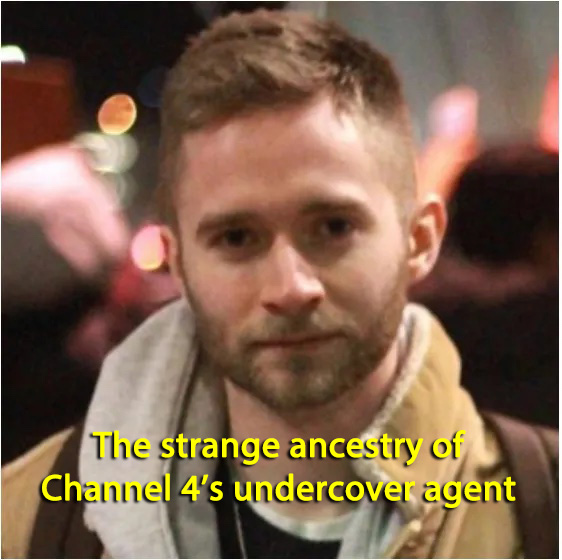Last night’s Channel 4 programme Undercover: Exposing the Far Right seemed obsessed by the need to press emotive buttons in discussing the family backgrounds of anti-fascists – but was surprisingly reticent about the ancestry of its star reporter/infiltrator Harry Shukman.
While visiting Poland, Shukman took the opportunity to be filmed at Warsaw’s Jewish cemetery and mentioned that his great-grandfather had emigrated to Britain from what is now Poland (and was then the Russian Empire).
Without pausing for breath and without apparent irony, Shukman said that his family knew nothing about the distant relatives who stayed behind in Eastern Europe – but then seconds later said that they “believed” their relatives had been gassed at Majdanek!
There was no mention at all of actual documented facts about Shukman’s family. Perhaps these facts wouldn’t fit Channel 4’s narrative of plucky left-liberal journalists bravely taking on a lavishly funded international nazi machine.
I exposed some of the facts about Shukman yesterday: here are some more.
Setting aside the predictable myths about gas chambers – after all, which self-respecting British Jew doesn’t claim to have relatives who were gassed? – we can confirm that one of Shukman’s close relatives was indeed killed during the Second World War.

But this was someone on the gentile side of the family – Shukman’s great-grandmother Margaret Fairweather. She was a pilot in the Air Transport Auxiliary and crashed her plane while attempting an emergency landing in Cheshire, England, in 1944.
Margaret was the daughter of Lord Runciman, a former government minister best known for the ‘Runciman Mission’ to Czechoslovakia in 1938, which provided detailed justifications for Prime Minister Neville Chamberlain’s now derided ‘appeasement’ policy. One can see why Harry Shukman is slightly embarrassed to admit to his leftwing friends and to a trendy woke Channel 4 audience that he has both a Viscount and a Baron in his family. His paternal great-great-grandfather was Viscount Runciman, while his maternal great-grandfather (as I discussed yesterday) was Lord Caccia, one of the leading British diplomats of the 20th century.
Another awkward fact is that the Runciman family had extensive intelligence connections, both to the secret communists who formed the Cambridge spy ring, and to more ‘establishment’ or conservative types.

It turns out that the infiltrator’s grandfather Harold Shukman (who as I mentioned in yesterday’s story became a leading expert on Soviet history and politics) was first recruited into the intelligence world thanks to string-pulling by his wife’s uncle, the celebrated historian Sir Steven Runciman.
Harold Shukman’s parents, who had arrived in Britain as immigrants from Russia in 1913, never obtained British citizenship. He was too young to serve in the Second World War, and left school with few qualifications in 1947, aged 16.
After two years working as a trainee radio and radar engineer in London, Shukman obtained deferment of his national service so as to continue his education at night school, but in 1951 (aged 20) he decided to end this deferment and join the RAF, because this would resolve ambiguity about his own nationality. (At that time he appeared to have dual British and Soviet nationality.)

The odd thing was that despite lacking basic qualifications, Shukman obtained a place at the Joint Services School for Linguists, a notorious Cold War ‘spy school’. This was thanks to the intervention of his future wife’s uncle Steven Runciman, best known as a historian of the Crusades and the Byzantine Empire.
Runciman was a notoriously camp homosexual, but this didn’t stop him serving in senior intelligence roles in the Balkans and Egypt during the Second World War. He was later investigated by MI5 due to his close pre-war friendship with fellow homosexual Guy Burgess, who fled to Moscow in 1951 after almost two decades of treachery as a Soviet mole inside several British secret services.
Another Runciman brother was the first husband of Rosamond Lehmann, the novelist and socialite who was a central player in crypto-communist literary circles during the 1930s and very much part of the social scene surrounding the Cambridge spy ring.
Towards the end of his long life, Steven Runciman lied to Burgess’s biographer Andrew Lownie about the extent of his friendship with the traitor. However, on balance it seems likely that Runciman was during the war closer to more conservative factions inside MI6. In 1941 he contributed to a dossier drawn up by veteran MI6 officer and fellow homosexual Col. Cudbert Thornhill, as part of a bitter bureaucratic civil war that bedevilled British intelligence in the Balkans and Cairo for much of that year.

In 2000 Ann Shukman (the infiltrator Harry Shukman’s grandmother) inherited Steven Runciman’s Scottish estate Elshieshields, with its 13th century tower. By that time she was long since divorced from Harry’s grandfather, and in 1994 had become one of the first women ordained as an Anglican priest. Runciman eventually died aged 97 while visiting the infiltrator’s uncle Henry, leader of a bizarre Zen Buddhist sect.
These deep roots in the tangled history of Britain’s intelligence services – and the sometimes contradictory role of Jews with dual or triple loyalties interacting with those services – cast an interesting light on Channel 4’s intrepid infiltrator.
Today’s liberal media – and a millennial generation who are blissfully unaware of their nation’s and their continent’s real history – prefer to emote about ‘the Holocaust’, or about ‘racism’, or about ‘sexism’, or about any number of ‘prejudices’ against LGBTXYZ.
But the inconvenient truths about European history are unavoidable, even when taking a quick look at the family history of their own plucky investigator.



